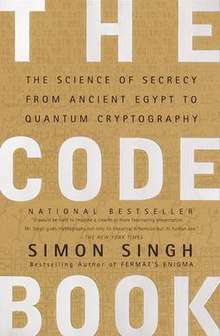The Code Book
The Code Book: The Science of Secrecy from Ancient Egypt to Quantum Cryptography is a book by Simon Singh, published in New York in 1999 by Doubleday.
 | |
| Author | Simon Singh |
|---|---|
| Country | United Kingdom |
| Language | English |
| Genre | Factual |
| Publisher | Fourth Estate |
Publication date | September 1999 |
| Pages | 416 pp (first edition) |
| ISBN | 978-1-85702-879-9 |
| OCLC | 59459928 |
The Code Book describes some illustrative highlights in the history of cryptography, drawn from both of its principal branches, codes and ciphers. Thus the book's title should not be misconstrued as suggesting that the book deals only with codes, and not with ciphers; or that the book is in fact a codebook.[1]
Contents
The Code Book covers diverse historical topics including the Man in the Iron Mask, Arabic cryptography, Charles Babbage, the mechanisation of cryptography, the Enigma machine, and the decryption of Linear B and other ancient writing systems.[2]
Later sections cover the development of public-key cryptography. Some of this material is based on interviews with participants, including persons who worked in secret at GCHQ.
The book concludes with a discussion of "pretty good privacy" (PGP), quantum computing, and quantum cryptography.
The book announced a "cipher challenge" of a series of ten progressively harder ciphers, with a cash prize of £10,000 which has since been won.[3]
The book is not footnoted but has a "Further Reading" section at the end, organized by chapter.
References
- In contemporary English-language jargon, the word "code" is often used for any sort of secret communication, whether or not that communication is actually performed using a code in the strict sense. Some other languages, e.g., Polish, tend to do the opposite, and refer to both principal types of cryptography as "cipher", as in "Biuro Szyfrów" ("Cipher Bureau").
- "Simon Singh website". Retrieved April 14, 2015.
- "Cipher Challenge | Simon Singh". simonsingh.net. Archived from the original on 2013-02-22. Retrieved 2017-08-27.
Bibliography
- "Of Riddles Wrapped in Enigmas", Whitfield Diffie, The Times Higher Education Supplement, September 10, 1999, p. 25. Retrieved 2009-02-19.
- A critical review of the book: "The Code Book: The Evolution of Secrecy from Mary, Queen of Scots to Quantum Cryptography, reviewed by Jim Reeds", Jim Reeds, Notices of the American Mathematical Society, vol. 47, no. 3, March 2000, pp. 369–72. Retrieved 2009-02-19. (61K PDF)].